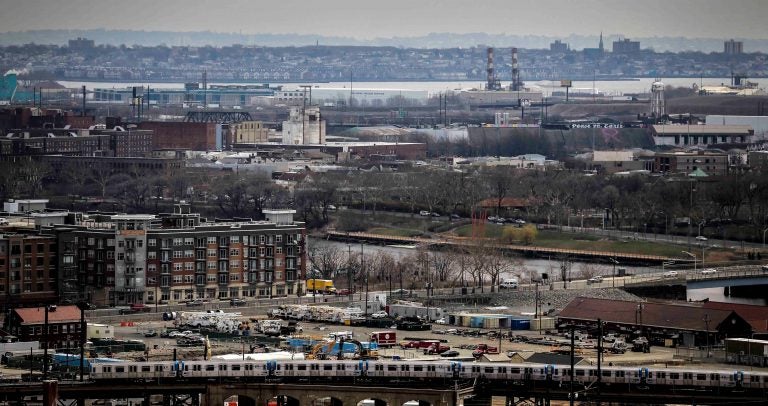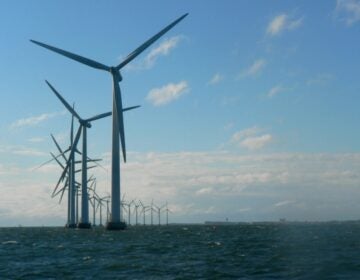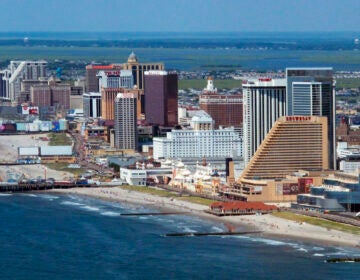N.J. climate report: Increasing temperatures could lead to more heat-related hospitalizations and deaths, especially in vulnerable communities
Increasing temperatures could lead to more heat-related hospitalizations and deaths in the coming years, especially in vulnerable communities.

In this Tuesday April 10, 2018, file photo are sections of Newark and the Passaic River in New Jersey. (AP Photo/Seth Wenig)
This story is part of the WHYY News Climate Desk, bringing you news and solutions for our changing region.
From the Poconos to the Jersey Shore to the mouth of the Delaware Bay, what do you want to know about climate change? What would you like us to cover? Get in touch.
State officials have long called New Jersey “ground zero” for climate change in the Mid-Atlantic.
The summer of 2022 was the third warmest summer on record, with a drought warning from the Department of Environmental Protection that lasted four months. Dr. James Shope, the applied climatologist at the New Jersey Climate Change Resource Center at Rutgers University, said it could be a “glimpse of the future.”
“Our rainfall in the future during the summer isn’t projected to change very much. And combine that with higher temperatures, it means that we think we’re going to be seeing drier drought conditions more frequently moving forward,” Shope said.
The prediction is a highlight of New Jersey’s annual “State Climate Report 2022,” released this week.
Increasing temperatures could lead to more heat-related hospitalizations and deaths in the coming years, especially in vulnerable communities. According to the center’s Heat Vulnerability Index, inland urban areas like Camden, Trenton, and Newark are more prone to negative heat effects due to paved surfaces and a lack of vegetation contributing to what is known as urban “heat islands.”
Residents in several rural areas, including parts of Salem, Cape May, Burlington, Gloucester, and Ocean Counties are also at risk for heat health effects
“Our most vulnerable aren’t just in our urban locations,” Shope said. “When it comes to heat, you have a number of more rural communities that are also very susceptible.”
Sea levels along the Jersey Shore are also expected to rise up to 1 foot by the end of the decade; a trend that could cause almost year-round flooding in places like Atlantic City by the turn of the century.
By 2100, average temperatures in New Jersey are expected to increase by up to five degrees Fahrenheit with low carbon emissions predictions and by up to 10 degrees Fahrenheit in higher emission scenarios.
The report comes just days after the Murphy Administration unveiled long-awaited environmental justice rules intended to alleviate health risks in over polluted cities.
When asked about the report’s findings on Friday, Gov. Phil Murphy said the state has more work to do to help adapt to the changing climate.
“I don’t think any state can touch our record on the environment over the past five-and-a-half years. But everything you see around us, reminds you, you got to keep your foot on the gas pedal here, you got to really keep acting,” Murphy said.
New Jersey became the first state in the U.S. in 2020 to require mandatory permit denials for new or existing power plants and similar facilities if an environmental justice analysis determines a new facility will have a disproportionately negative impact on overburdened communities.
In February, Murphy announced the state’s commitment to ending the sale of gasoline-powered vehicles and having its entire economy powered by clean energy by 2035.
The state Legislature is considering a bill, introduced by Senator Bob Smith, D-Middlesex, that would forbid the state from investing state pension and annuity funds in the 200 largest publicly-traded fossil fuel companies. Smith has also introduced a resolution that amends the state Constitution to prohibit construction of new fossil fuel power plants.

Get daily updates from WHYY News!
WHYY is your source for fact-based, in-depth journalism and information. As a nonprofit organization, we rely on financial support from readers like you. Please give today.







